Coalition of Ethiopian Federalist Forces
Last updatedThis article needs to be updated.(April 2021) |
Coalition of Ethiopian Federalist Forces የኢትዮጵያ ፌዴራሊስት ኃይሎች ጥምረት | |
|---|---|
 | |
| Leader | Dereje Bekele |
| Founded | 2019 |
| Dissolved | 2020 |
| Succeeded by | United Front of Ethiopian Federalist and Confederalist Forces |
| Headquarters | Mekelle |
| Ideology | Ethnic federalism Revolutionary democracy |
| Political position | Left-wing |
| Member parties | TPLF (before 2020) Teranafit |
The Coalition of Ethiopian Federalist Forces (Amharic : የኢትዮጵያ ፌዴራሊስት ኃይሎች ጥምረት) was a coalition of Ethiopian political parties from 2019 to 2020 that included the Tigray People's Liberation Front (TPLF), the former ruling party that lost power in 2018. [1] [2] [3]
Contents
Background
In August 2019, the former dominant political party in Ethiopia, the Tigray People's Liberation Front (TPLF), that lost power in 2018, proposed creating a new ethno-federalist alliance. According to René Lefort and William Davison writing in Ethiopian Insight , the TPLF was likely to have difficulty creating an ethno-federalist alliance because it was "reviled from all parts of the Ethiopian political spectrum as the party that either created a despised ethnic federalism to divide-and-rule in its narrow ethnocentric interests, or the control-freaks that refused to allow true multinational federalism to breathe through its authoritarian blanket." [4]
During 3–4 December 2019, the TPLF organised the second of two forums for "rescuing the constitution and multi-ethnic Federal System" in Mekelle. Borkena described the attendance as "not great". The coordinator of the forum, Mulugeta, stated that fifty national and ethnic-based parties and 700 prominent individuals attended the forum. [5]
Creation
The Coalition of Ethiopian Federalist Forces was created in Mekelle. [1] On 14 May 2020, when the general election scheduled for August 2020 was delayed by the federal government due to the COVID-19 pandemic, the Coalition held a meeting in Addis Ababa and stated that it supported the decision, while the TPLF opposed the decision. [6]
On 25 June, at the Coalition's fourth meeting, in Addis Ababa, the Coalition decided to dismiss the TPLF [2] and the Ethiopian Democratic Union if they missed any more meetings. Reasons cited for dismissing the two parties included: "dividing the members of the coalition and creating pressure"; "exploiting the coalition as a means to [destabilise] the country"; "missing meetings and insisting that meetings must take place in Mekelle"; and TPLF's decision to hold the 2020 Tigray regional election. [1]
Structure
As of 25 June 2020 [update] , Dereje Bekele was the chair of the Coalition. The Coalition claims to be constituted of 24 political parties. [1]
Platforms, proposals
On 29 September 2020, a TPLF spokesperson proposed that a Coalition proposal posted on Facebook be used to continue a legal form of government following what the TPLF said was the end of the government's mandate on 5 October 2020. The Coalition's text proposed the "formation of an independent technocratic caretaker government the composition of which reflects the diversity of the Ethiopian people ... in line with the constitution and in consultation with all political stake holders and will be in charge until such time the peace and national salvation conference comes up with an agreed solution to the political and constitutional problems." [3]
Related Research Articles

The politics of Ethiopia are the activities associated with the governance of Ethiopia. The government is structured as a federal parliamentary republic with both a President and Prime Minister. The government is multicameralism with a house of representative and a council. The term politics of Ethiopia mainly relates to the political activities in Ethiopia after the late 20th century when the democratization took place in the nation. The current political structure of Ethiopia was formed after the Tigrayan People's Liberation Front (TPLF) overthrew dictator President Mengistu Haile Mariam in 1991. General election was held in June 1994 and Ethiopia has maintained a multiparty political environment till today.

The government of Ethiopia is the federal government of Ethiopia. It is structured in a framework of a federal parliamentary republic, whereby the prime minister is the head of government. Executive power is exercised by the government. The prime minister is chosen by the lower chamber of the Federal Parliamentary Assembly. Federal legislative power is vested in both the government and the two chambers of parliament. The judiciary is more or less independent of the executive and the legislature. They are governed under the 1995 Constitution of Ethiopia. There is a bicameral parliament made of the 108-seat House of Federation and the 547-seat House of Peoples' Representatives. The House of Federation has members chosen by the regional councils to serve five-year terms. The House of Peoples' Representatives is elected by direct election, who in turn elect the president for a six-year term.
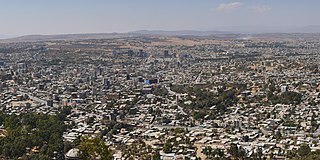
Mekelle, or Mekele, is a special zone and capital of the Tigray Region of Ethiopia. Mekelle was formerly the capital of Enderta awraja in Tigray. It is located around 780 kilometres (480 mi) north of the Ethiopian capital Addis Ababa, with an elevation of 2,254 metres (7,395 ft) above sea level. Administratively, Mekelle is considered a Special Zone, which is divided into seven sub-cities. It is the economic, cultural, and political hub of northern Ethiopia.
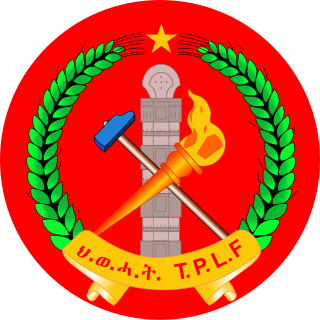
The Tigray People's Liberation Front, also called the Tigrayan People's Liberation Front, is a left-wing ethnic nationalist paramilitary group, a banned political party, and the former ruling party of Ethiopia. It is designated as a terrorist organization by the Ethiopian government. It is widely known as Woyane, or Wayane in older texts and Amharic publications.

Ethiopian nationalism, also referred to as Ethiopianism or Ethiopianness, is a political principle centered on the unification of Ethiopian identity. Originated from throughout ancient history, the Aksumite Empire was the first kingdom for their unified civilization and social integration to adopt the name "Ethiopia" under Ezana's reign in 4th century. For more than a century, Amhara ruling elite used the ideology to pursue an assimilation policy and consolidate power. Moreover, the notion of Ethiopian integrity was reinforced by Battle of Adwa, an important event where Ethiopia defied European colonization by defeating Italy in 1896.
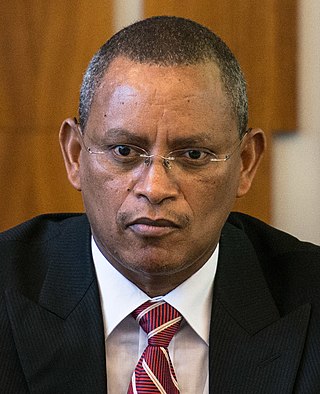
Debretsion Gebremichael is an Ethiopian politician and current president of the Tigray Region and chairman of Tigray People's Liberation Front (TPLF). His position as titular head of the Tigray Region is disputed by the federal government of Ethiopia who in November 2020 appointed Mulu Nega as the chief executive of the Transitional Government of Tigray, succeeded by Abraham Belay. Since July 2021, Debretsion leads again the Tigray Region, while Abraham Belay left the transitional government to become Ethiopia's minister of Defence.

Abiy Ahmed Ali is an Ethiopian politician who has been the 4th prime minister of the Federal Democratic Republic of Ethiopia since 2 April 2018. He won the 2019 Nobel Peace Prize for his work in ending the 20-year post-war territorial stalemate between Ethiopia and Eritrea. Abiy was the third chairman of the Ethiopian People's Revolutionary Democratic Front (EPRDF) that governed Ethiopia for 28 years and the first Oromo in that position. Abiy is an elected member of the Ethiopian parliament, and was a member of the Oromo Democratic Party (ODP), one of the then four coalition parties of the EPRDF, until its rule ceased in 2019 and he formed his own party, the Prosperity Party.

The 2021 Ethiopian general election to elect members of the House of Peoples' Representatives was held on 21 June 2021 and 30 September 2021. Regional elections were also held on those dates.

The Prosperity Party is a political party in Ethiopia that was established on 1 December 2019 as a successor to the Ethiopian People's Revolutionary Democratic Front (EPRDF) by incumbent Prime Minister Abiy Ahmed. The merger into a countrywide party is part of Abiy's general policy of distancing the country's politics from ethnic federalism. It ran for the first time in the 2021 general election.
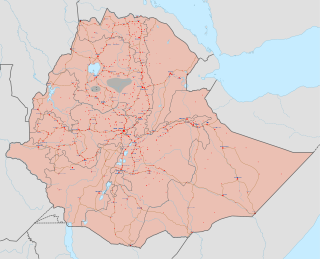
The Tigray War was an armed conflict that lasted from 3 November 2020 to 3 November 2022. The war was primarily fought in the Tigray Region of Ethiopia between the Ethiopian federal government and Eritrea on one side, and the Tigray People's Liberation Front (TPLF) on the other.
The Transitional Government of Tigray was a caretaker administration that was formally declared by the House of Federation of Ethiopia on 7 November 2020, in the context of a conflict between the Tigray People's Liberation Front (TPLF), in power in the Tigray Regional State and the federal government of Ethiopia. In late November 2020, the administration, headed by Mulu Nega, planned public consultation and participation in choosing new leaders at the regional and zonal level and preservation of woreda and kebele administrations.
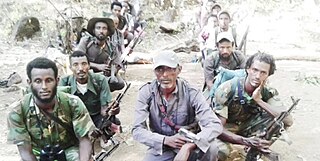
Fano, also FANO or Fanno, is an Amhara militia. One stated objective of Fano leadership as of March 2020 was for Benishangul-Gumuz Region's Metekel Zone, the districts of Welkait and Raya in the Tigray Region, and the district of Dera in Oromia to be placed under the control of the Amhara Region. During the Tigray conflict, Fano supported federal and Amhara regional forces against rebels aligned to the Tigray People's Liberation Front (TPLF). Fano members have been accused of participating in ethnic massacres.
Arena Tigray or Arena Tigray For Democracy and Sovereignty is an Ethiopian political party based in the Tigray Region and participating in the Medrek coalition federally.
The Assimba Democratic Party is an opposition party in the Tigray Region of Ethiopia.
The Tigray Democratic Party is an opposition party in the Tigray Region of Ethiopia.
Yemane Niguse was an Ethiopian politician who co-founded the Fenkil Tigray Movement.

Many of the roots of the ongoing civil conflict within Ethiopia date back to the mid-twentieth century and earlier. Following the 2018 dissolution of the ethnic federalist, dominant party political coalition, the Ethiopian People's Revolutionary Democratic Front, there was an increase in tensions within the country, with newly resurgent regional and ethnically based factions carrying out armed attacks on military and civilians in multiple conflicts throughout Ethiopia.

The TDF–OLA joint offensive was a series of military battles starting in late October 2021 opposing a coalition of the Tigray Defense Forces (TDF) and Oromo Liberation Army (OLA) against the Ethiopian National Defense Forces (ENDF) in the context of the Tigray War and the OLA insurgency. The TDF and OLA took control of several towns south of Tigray Region in the direction of the Ethiopian capital Addis Ababa in late October and early November. Claims of war crimes included that of the TDF extrajudicially executing 100 youths in Kombolcha, according to federal authorities.

The Amhara genocide is an ongoing systematic massacre of ethnic Amhara and Agew people in Ethiopia since 1990. Large-scale killings and grave human rights violations followed the implementation of the ethnic-federalist system in the country. In most of the cases, the mass murders were silent with perpetrators from various ethno-militant groups— from TPLF/TDF, OLF–OLA, and Gumuz armed groups.

Federalism in Ethiopia can be best explained by considering the ethnic and geographic diversity of modern-day Ethiopia, interpreted through the history of the nation’s reunification. Ethiopia contains over 80 ethnic groups of varying sizes, languages, religions and customs. According to the 2007 census, the top seven groups constitute 83% of the population. Ethiopia is mainly a rural country, with an urbanisation rate of only 23.2% (2023) and exhibits a wide variety of topography that impacts agricultural and economic activity.